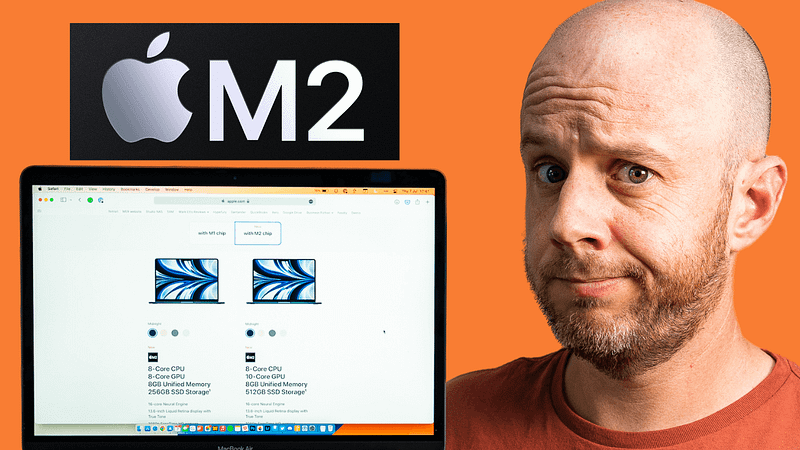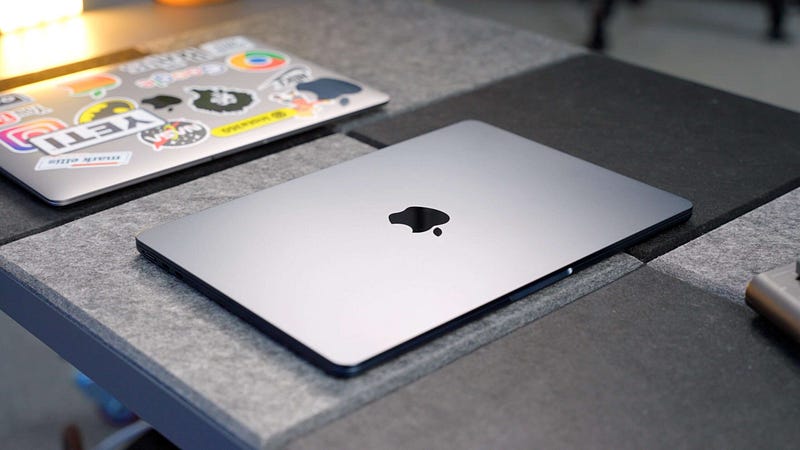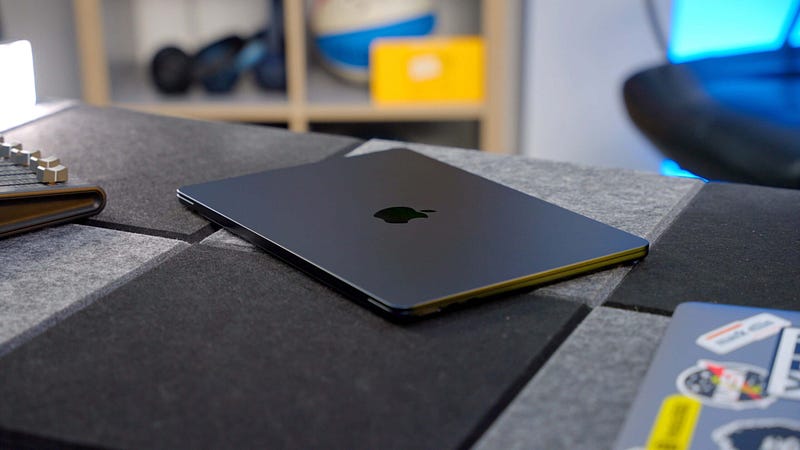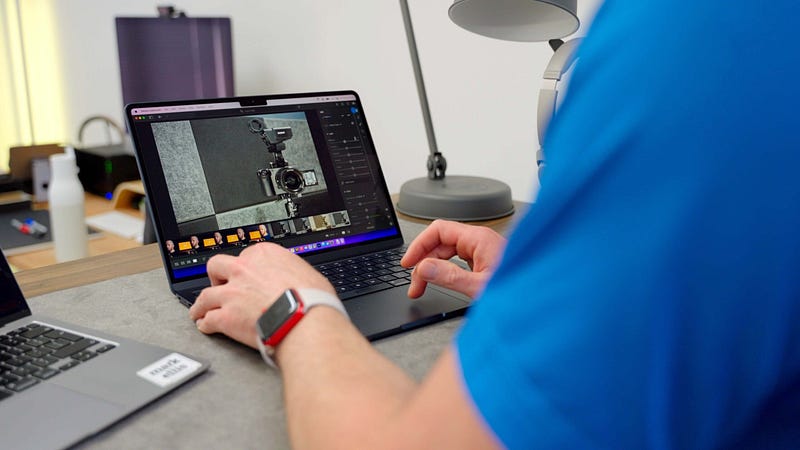How to Select the Perfect M2 MacBook Air: A Comprehensive Guide
Written on
Choosing the Right M2 MacBook Air
Let’s navigate this decision-making process together!

Image courtesy of author
The M2 MacBook Air has officially launched! The pre-order period has ended, and you can now visit an Apple store to experience it firsthand. However, selecting an Apple laptop can be quite challenging. The multitude of options available can be overwhelming, especially if you aren’t entirely sure of what you need or desire.
But don’t fret—I’m here to assist you. In this guide, we’ll thoroughly examine the configuration options for the M2 MacBook Air to help you determine which model is best suited for your requirements.
Budget Considerations
Before we dive in, I recommend establishing two budget categories:
- Ideal Budget: This is the amount you can comfortably spend today without any concern. You want to ensure you get good value, and this amount is set aside and ready for use.
- Stretch Budget: This is a bit more flexible, allowing you to stretch your finances without causing significant strain. While it might not feel as comfortable, if it results in a high-value purchase, you’ll likely be satisfied in the long run.
With your budgets defined, let’s get started!
I suggest visiting the Apple Store for your region before proceeding. Here are the links for the US and UK: [UK](#) / [US](#).
Understanding the Base Model
There’s a lot of debate surrounding the base model of Apple’s silicon laptops.

Image courtesy of author
Many claim that 8GB of unified memory is insufficient in 2022. While I agree in certain scenarios, if you find yourself in that category, you likely already realize you need more RAM—and you’re probably not reading this guide.
If you’re uncertain but suspect you’ll engage in demanding tasks like video editing, audio work, or programming, consider your stretch budget and prioritize higher unified memory in your M2 MacBook Air. This way, you’ll avoid any regrets.
For most users, the 8GB of unified memory in the base model is adequate. Disregard the chatter about “swap file usage” and the elusive out-of-memory errors—I’ve never encountered them myself. I’ve been successfully running my business on an 8GB M1 MacBook Air for nearly two years, and it hasn’t struggled once. Currently, I’m typing this post on a base model M2 MacBook Air, which will perform just as well.
Choosing Between M1 and M2
If your budget is tight and the base model is all you can afford, go for it. You won’t regret your decision.
For those looking to invest more in an M2 MacBook Air, read on.
Processor and Memory Options
The M2 MacBook Air offers two processor choices. Both come with an 8-core CPU, but for an additional £100/$100, you can upgrade from an 8-core GPU to a 10-core GPU.

Image courtesy of author
Is the upgrade worthwhile? Not really. It’s nearly impossible to notice the difference between an 8-core and a 10-core GPU in a MacBook Air. If you're truly focused on video performance, investing in a MacBook Pro would be a better choice.
So, I recommend skipping that upgrade for now and reconsidering it later if the extra £100/$100 is negligible to you.
When it comes to unified memory, the options get more intriguing. I’ve even written an extensive guide on it, which you can find linked here. In short, 8GB is suitable for most casual users (trust me, it will meet your needs), 16GB is ideal for those who are concerned about 8GB being insufficient and can afford the upgrade, and 24GB is reserved for those who are certain they require that amount.
Storage Options
The M2 MacBook Air offers four storage options: 256GB, 512GB, 1TB, and 2TB. Similar to memory, there’s a lot of misinformation regarding how much storage you truly need these days.

Image courtesy of author
If, like me, you don’t store much locally (preferring cloud services like iCloud Drive and Dropbox), the 256GB variant is perfectly adequate. I use 256GB SSDs in both my M1 MacBook Air and my 24-inch M1 iMac, and I’ve never run out of space.
There’s been plenty of discussion and concern regarding the base model M2 MacBook Air's 256GB SSD. Now that I own one, I can assure you there’s nothing to worry about with that SSD. Unless you’re pushing it to its limits daily and monitoring performance benchmarks, it’s not an issue.
For those who require more storage, remember that Apple’s prices increase significantly as you upgrade. I recommend sticking to 512GB unless you genuinely need extensive media storage.
I advocate for external SSDs as a great solution. I frequently use them for video editing and recommend Sandisk for fast, reliable options. Keep in mind that storage is the only aspect you can upgrade in the future; all other specifications are final once you click ‘buy now.’
Power Adapter Choices
We now have three power adapter options to choose from. While this might not be the most thrilling addition to your order, it’s essential to make a decision.
The M2 MacBook Air comes standard with a 30W charger, which is sufficient for most users. I opted for this one. If you prefer quicker charging, you can pay an extra £30/$20 for the 67W charger.
Is it worth it? You can get this charger for “free” if you select the 10-core GPU and at least 512GB of storage. If you don’t choose that configuration and don’t mind the charging speed (the 30W charger is reasonably efficient), I’d recommend saving that extra cash.
There’s also a 35W dual USB-C charger for £30/$20, which can replace the 60W option if you choose the higher spec configuration, but I would suggest passing unless you have a specific need.
Pre-installed Software and AppleCare+
I can't advise you on whether you need Final Cut Pro or Logic Pro, but if you do, this is the perfect time to purchase them. They won’t be cheaper when bundled with a new Mac, but they will come pre-installed for your convenience.

Image courtesy of author
Regarding AppleCare+, I typically don’t purchase it anymore. For those unfamiliar, it provides coverage against accidental damage for three years, along with expert technical support from Apple.
I can’t say whether it’s worth the investment, but in my experience, modern Macs tend to be quite durable. I recognize I’m tempting fate, but I can’t recall the last time I faced a significant issue with a Mac that necessitated a return to Apple.
Keep in mind that all new Macs come with a one-year warranty, giving you some peace of mind. I suggest considering AppleCare+ last. If you’ve already reached your stretch budget, it may not be wise to cut back on other areas just to accommodate it.
Final Thoughts
That’s it! You’ve reached the end of the selection process. All that’s left is to check out, make your payment, and eagerly anticipate the arrival of your new M2 MacBook Air.
What specifications did you choose? Feel free to share in the comments below!
Before You Leave
Join my behind-the-scenes mailing list! If you enjoy my writing, there's so much more on Medium. As a paying member, I highly recommend joining. Click here to sign up (a portion of your membership fee will support my work!).